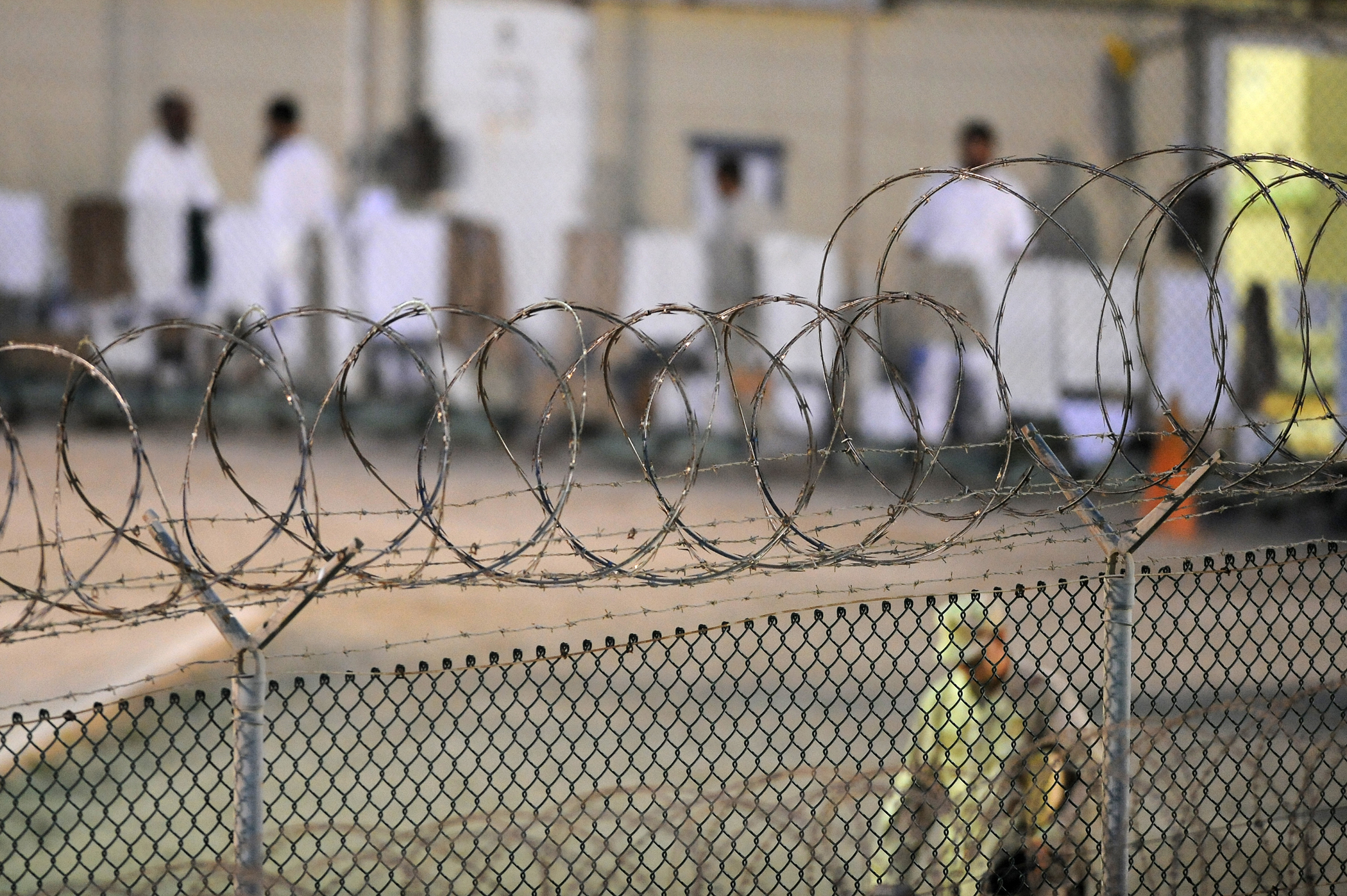Secretary Austin's Fateful GTMO Plea Deals Decision

Published by The Lawfare Institute
in Cooperation With

Several weeks ago, Khalid Sheik Mohammed (KSM), along with two other defendants—Walid Bin Attash and Mustafa al Hawsawi—agreed to plead guilty before the military commissions at Guantanamo Bay and to testify publicly about their roles in the 9/11 attacks in exchange for serving life sentences at the Guantanamo facility. Yet within 48 hours of the announcement of the epic plea deal, Secretary of Defense Lloyd Austin had issued an order canceling the deal and withdrawing the authority of Susan Escallier, the convening authority of the commissions, to enter into pretrial agreements. This week, the parties in the cases before the commission must present their arguments on the question of whether Secretary Austin had the right to void the plea bargain.
On the one hand, the secretary wields the power of the president, whose constitutional Article II authority gives the executive branch extensive control over the military commissions. This authority is also codified in 10 U.S.C. § 1802, known as the Military Commissions Act of 2009. But Austin arguably used that authority improperly and crossed the threshold into what is known as “unlawful command influence” under 10 U.S.C. § 837, a standard that is also built into the Military Commissions Act.
Unlawful command influence forbids a superior in the chain of command from attempting to coerce or put undue pressure on a judge, a member of a jury, or any individual involved in a military legal proceeding. For example, the statute provides: “No court-martial convening authority, nor any other commanding officer, may censure, reprimand, or admonish the court or any member, military judge, or counsel thereof, with respect to the findings or sentence adjudged by the court, or with respect to any other exercise of its or his functions in the conduct of the proceeding.” By canceling a plea bargain agreed to by the prosecution and defense alike and approved by the convening authority of the commissions, Austin’s decision signaled that the death penalty is the only appropriate sentence in the 9/11 cases, which may qualify as “censuring” or “admonishing” the convening authority and the judge for permitting the parties to agree to a plea bargain. By taking over the job of the convening authority, the secretary is dictating the results of the operations of the commission—potentially violating 10 U.S.C. § 837 and the Military Commissions Act.
Did Austin consult with the White House before he made this decision? He did not say. But if he did, that would raise particular concerns that the decision violated the prohibition against unlawful command authority in Title 10 and the Military Commissions Act.
Whether or not the commission upholds Austin’s decision and therefore his authority, one conclusion about this incident is undeniable: The plea agreement the secretary canceled was the only realistic option for achieving a conviction in the military commissions system for these defendants, as a 2022 report issued jointly by the Center for Ethics and the Rule of Law (CERL) and the Annenberg Public Policy Center (APPC) of the University of Pennsylvania concluded, which one of us co-chaired with Harvey Rishikof, a former convening authority of the military commissions. Forbidding the plea agreement has thus deprived the victims’ families, as well as the American public, of an opportunity to reach badly needed closure with respect to the 9/11 attacks and has likely removed the last chance for a guilty verdict in these cases. Thus, even if Austin possesses the authority to cancel plea deals in the military commissions, doing so is profoundly unwise and short-sighted, and it undermines the closure the parties involved deserve.
The Impossibility of the Death Penalty
Secretary Austin did not explain his actions, but in all likelihood he saw himself as protecting the possibility of a death sentence for the three defendants. His calculation is mistaken, as it is very unlikely that any death sentence can result from the military commissions.
The short and most straightforward reason is that the extensive torture to which the U.S. subjected each of the defendants renders genuine rule-of-law trials nearly impossible. As the ongoing pretrial litigation regarding the status of confessions of the defendants has illustrated, it is not possible to conduct a fair and open trial of defendants in the U.S. or any system that aspires to justice when the primary evidence against the defendants was adduced under torture, even when that evidence was obtained by “clean teams” conducting interrogations in the wake of torture foreswearing such methods themselves. While other issues have plagued the proceedings and required endless pretrial motions and hearings, the fundamental question of how the government can conduct a fair capital trial of defendants who have been tortured to obtain confessions remains unanswered.
Conducting trials of defendants who have been tortured and otherwise abused in captivity is so antithetical to the U.S. system of justice that when senior military lawyers in the Pentagon, including one of us (Mora), learned in early 2003 that then-Secretary of Defense Donald Rumsfeld had authorized the use of abusive interrogation practices at the Guantanamo Bay Detention Center on detainees captured in the war on terror, they argued against it in part on the ground that any abuse could derail subsequent attempts to prosecute the detainees in military commissions or courts—because of the tainted nature of the resulting evidence. In a Pentagon meeting in January 2003 with Defense Department General Counsel Jim Haynes, Mora pointed out, among other things, why abusive treatment of detainees should not be authorized and that such abuse would severely complicate any effort to prosecute the abused detainees. Haynes did not disagree.
The objecting senior military lawyers were told that even if they were right that using torture-tained evidence would undermine just trials, the need for “actionable intelligence” outweighed the interests of criminal justice. Using this same logic, and upon the advice of lawyers in the Office of Legal Counsel, the CIA used interrogation techniques euphemistically referred to as “enhanced interrogation techniques,” or EITs, involving waterboarding among other inhumane and illegal methods on KSM and the other defendants. KSM himself is reported to have been waterboarded 183 times while held in Guantanamo and other secret prisons known as “black sites.”
But in addition to the concrete evidentiary issues associated with the admissibility of torture-tainted evidence, the torture of the detainees has left many decision-makers involved in these cases unwilling to impose the death penalty or even to continue with prosecuting the cases. In 2008, the then-convening authority, Susan Crawford, felt compelled to drop all charges against the so-called 20th hijacker and death penalty defendant Mohammed al-Qahtani upon learning of the extent of his torture in U.S. custody.
Or consider the reaction of members of a U.S. military jury in the case of Majid Shoukat Khan, when seven of the eight members of the military jury rebuked the Department of Defense for the defendant’s treatment at the hands of U.S. interrogators, calling it “a stain on the moral fiber of America” and recommending clemency in a special letter to the judge. Were the cases of KSM and the other two defendants to proceed to trial, against all odds, testimony similar to Majid Khan’s would be presented with the likely result that a jury would find it difficult to reach a unanimous verdict in favor of a death sentence.
The question of torture-tainted evidence and the reaction of actors in the commissions to the history of torture is especially complex from a legal standpoint because it is tied to many other unresolved legal disputes, particularly the all-important questions federal courts have taken up in Al-Hela v. Biden of whether Guantanamo detainees possess constitutional due process rights, and if so, what kind of process is due. For the moment, courts have dodged these questions and simply concluded that defendants like those in the current cases have had sufficient process. In an Article III court, were due process protections to apply, it would be impossible to proceed with the trial of a defendant who had been tortured in the way that these defendants have been. And the history of torture is just one among many profound irregularities—such as many years of incarceration without sentence, lack of access to trial transcripts and discovery because of excessive classification, inadequate health care during incarceration, and more.
It comes as no surprise, then, that 21 years later, no case in the military commissions has yet proceeded to a full trial. Some of the defendants have been released to their home countries without ever having been charged; some have been cleared for transfer and are waiting for a host country to accept them; some are being held without charge in indefinite detention; and others’ cases have been tied up endlessly in pretrial motions relating to, among other things, the admissibility of torture-derived evidence.
The CERL Working Group found that “[t]he [Department of Justice] will need to evaluate the quality and credibility of evidence in each case, whether evidence will likely be excluded at trial because it was obtained by illegal and unconstitutional means such as torture, and whether a plea bargain is the most appropriate disposition of each.” But the report concluded that the Department of Defense “should attempt to resolve as many cases as possible by guilty plea, whether by pleas conducted in the commissions or in federal court by videoconference. In order to facilitate such pleas, DOD should eliminate the death penalty from the range of possible sentences for defendants willing to plead guilty.”
As the report detailed, a plea agreement is the most likely avenue for the much-needed closure and resolution of the cases that remain in the commissions system. If Secretary Austin has another means of resolution in mind, he should announce it and implement it immediately. But if his plan is simply to continue what has transpired for the past 23 years, it should by now be clear that the time has long since passed to abandon the fantasy of successful resolution by trial and imposition of the death penalty in a just process of adjudication.
For those closely tracking the history of the commissions, the canceled plea deal was déjà vu all over again. In 2018, another convening authority, Harvey Rishikof, was relieved of his position for attempting to broker a similar plea deal, also involving KSM. And then as now, the department’s actions prompted accusations of unlawful command authority. The repeated disconnect between the convening authority and the secretary of defense, as well as the Defense Department’s insistence on chasing the elusive and unrealistic goal of death sentences for the detainees, provide redundant evidence of the dysfunction of the military commissions. And then as now, the most important source of that dysfunction is the history of CIA-led torture, a fact that permeates the proceedings and taints any effort to enter a trial process guided by the rule of law.
The alternative to plea bargains is not a normal law-conforming trial that is likely to result in a unanimous jury recommendation of death. The only alternative to the sort of plea agreement Austin reversed is the theater-of-the-absurd process that merely mimics, but does not actually furnish, a legally guided process for the dispensing of objective justice. A true legal trial confers legitimacy on the outcome, because the fairness of the process means that any final conviction is supported by the weight of both the law and moral norms. But the nearly quarter century of attempts to turn these ill-fated commissions into a judicial body with rule-of-law statute has been repeatedly stalled and progress sometimes even reversed, such as when three years of pretrial proceedings in the al-Nashiri case had to be voided because the presiding judge, Vance Spath, had failed to disclose a conflict of interest.
Even if the thicket of pretrial problems connected with the admissibility of evidence attributable to the history of CIA-led torture is somehow resolved and the cases proceed to trial, a nearly endless list of legal complexities will still stand in the way of reaching an actual verdict and sentencing. For example, with the passage of time, the dearth of available witnesses to KSM’s and the other defendants’ roles will be an important additional factor in attempting to secure a conviction pursuant to a trial process, along with the government’s persistent desire to protect all aspects of the cases as classified and state secrets, such as has complicated the situation of other detainees like Abu Zubaydah.
The decades of stagnation in the military commissions has not only meant lack of justice for the families of the victims and the defendants, but it has also meant no sense of closure for the American people as a whole, for whom the lack of a guilty verdict leaves the horrific attacks on American soil on Sept. 11, 2001, as an open, festering wound. For the cases that are in the commissions system, if they do not resolve through guilty pleas, they will probably not resolve at all. The result will likely be that the defendants the U.S. set out to prosecute to the utmost will die in pretrial confinement, without the public condemnation and resolution that a guilty verdict and duly administered sentence could uniquely supply. The horror of this possibility pales in comparison with the near certainty that many other detainees, currently held at Guantanamo under indefinite law of war authority, will die in custody without ever even being charged with a crime.
Given that both types of detainees—defendants charged before the commissions and detainees held under administrative law-of-war detention without charge—will likely die of old age in custody, accelerated by their CIA-induced injuries in Guantanamo Bay, and never encounter freedom again, one might wonder why it matters whether they are in prison for life after being charged or before being charged, after a conviction or before a conviction. Yet surely it does matter whether a democratic nation locks people up indefinitely without appropriate process. Surely it matters to the American public whether there will be an ultimate reckoning with regard to the worst terror attack on U.S. soil. Surely it also matters to the families of the victims whether the perpetrators of the 9/11 attacks are ever declared “guilty” or simply remain in detention by default and paralysis of the system.
What there hasn’t been is precisely what would vindicate the families of the victims and score the biggest victory against terrorism: a full airing of the evidence in a legitimate, fair, and open judicial process, followed by a jury that could weigh the evidence and reach a conviction based on that evidence, followed by the imposition of a fair and appropriate sentence. But this is precisely what cannot be expected to happen in the Guantanamo military commissions. The plea deals, which would have required that the defendants testify, were a solid second-best solution.
***
President Obama pledged to close the Guantanamo Bay detention center in his 2008 presidential campaign. In 2016, he tried to revive that project by unveiling a detailed White House plan to close the camp. President Biden followed suit, committing to close the camp at the outset of his administration. Yet nearly a quarter century after the Navy detention center started housing detainees in the war on terror, Guantanamo is still operational and costing taxpayers roughly $13 million a year per prisoner. It remains and is still, in the words of the New York Times editorial board in a recent article, a place “whose name has become synonymous with American shame.”
For what purpose does the U.S. keep Guantanamo open? Ironically, more than 20 years after Secretary Rumsfeld’s fateful decision to embrace torture as a means of interrogation, it has become clear that the intelligence value obtained from the use torture was negligible at best, and in some cases affirmatively misleading. But meanwhile, the impact of this abuse on the efforts to prosecute the defendants was as damaging as the Defense Department lawyers predicted.
American laws and values do not permit Secretary Austin or anyone else to erase the judicial impact of the torture the U.S. inflicted on the defendants. One might say that for this reason prosecutorial failure was baked into the initial design of the commissions. Given this, there is no just or even effective resolution other than Austin’s withdrawal of his objection to the acceptance of the plea agreements. We urge him to exercise his authority to restore the plea deal, if that is possible at this point, and to use the opportunity to educate the public by explaining why a plea deal is the best the system can possibly hope to produce, given the history of torture, and to move swiftly through the defendants to resolve cases though additional guilty pleas, transfers, and any other means of emptying the Guantanamo Bay prison camp on the path toward shutting it down for good.





-(1)-(1).png?sfvrsn=ebd4ed39_5)

